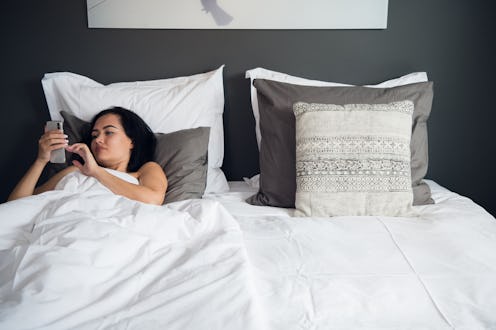Life
Scrolling On Your Phone Before Bed Is Messing With Your Sleep In This Creepy, Subtle Way

All the advice on how to get better sleep tells you not to use electronic devices before bed. You’ve heard it before; they say the blue light messes with your circadian rhythm, so you’ll sleep better if you put down the smartphone or turn off the TV at some point before you try to go to sleep. But no one tells you exactly why screen time disrupts sleep. Well, now researchers have published a study in Cell Reports that explains exactly how cell phone blue light messes with your sleep.
What the researchers found is that it all has to do with specific cells in the retina, a light-sensitive membrane that lines the back of the inside of the eye, Medical News Today reports. These cells contain a protein called melanopsin, says Medical News Today, and those proteins help you process ambient light. When your eyes are exposed to ambient light for longer periods of time, the melanopsin regenerates inside your eye, according to Medical News Today. If the melanopsin keeps regenerating, says Medical News Today, it sends a signal to your brain about how much light is in your environment, and that tells your brain how to regulate your sleep. Weird, right?
"Compared to other light-sensing cells in the eye, melanopsin cells respond as long as the light lasts, or even a few seconds longer," Ludovic Mure, staff scientist and first author of the paper, said in a news release. "That's critical, because our circadian clocks are designed to respond only to prolonged illumination."
But researchers also found that a second protein called arrestins, which were once thought to stop the eye’s response to light, actually kept the melanopsin sensitive to light, according to the news release. When the melanopsin and arrestins work together, says the news release, the eye seems to continuously respond to light. "Our study suggests the two arrestins accomplish regeneration of melanopsin in a peculiar way," Satchin Panda, senior author of the study, said in the news release. "One arrestin does its conventional job of arresting the response, and the other helps the melanopsin protein reload its retinal light-sensing co-factor. When these two steps are done in quick succession, the cell appears to respond continuously to light."
According to Harvard Health, light of any kind can have a negative impact on sleep, but blue light in particular has the most harmful effect. In fact, Harvard Researchers conducted an experiment comparing the effects of blue light exposure to green light exposure and found the blue light suppressed melatonin secretion for about twice as long and shifted circadian rhythms twice as much as green light exposure, Harvard Health reports.
But there are ways to protect yourself from blue light at night, says Harvard Health, such as avoiding bright screens a few hours before bed, switching to LED or compact fluorescent lightbulbs, and exposing yourself to lots of bright light during the day. If you work the night shift, Harvard Health recommends wearing blue light-blocking glasses.
The researchers say they hope these findings lead to new treatments for migraines, insomnia, jet lag, and even circadian rhythm disorders. Now that you know exactly how blue light effects your sleep cycle, you can figure out the best way to adjust your bedtime routine so you get the best sleep you can.